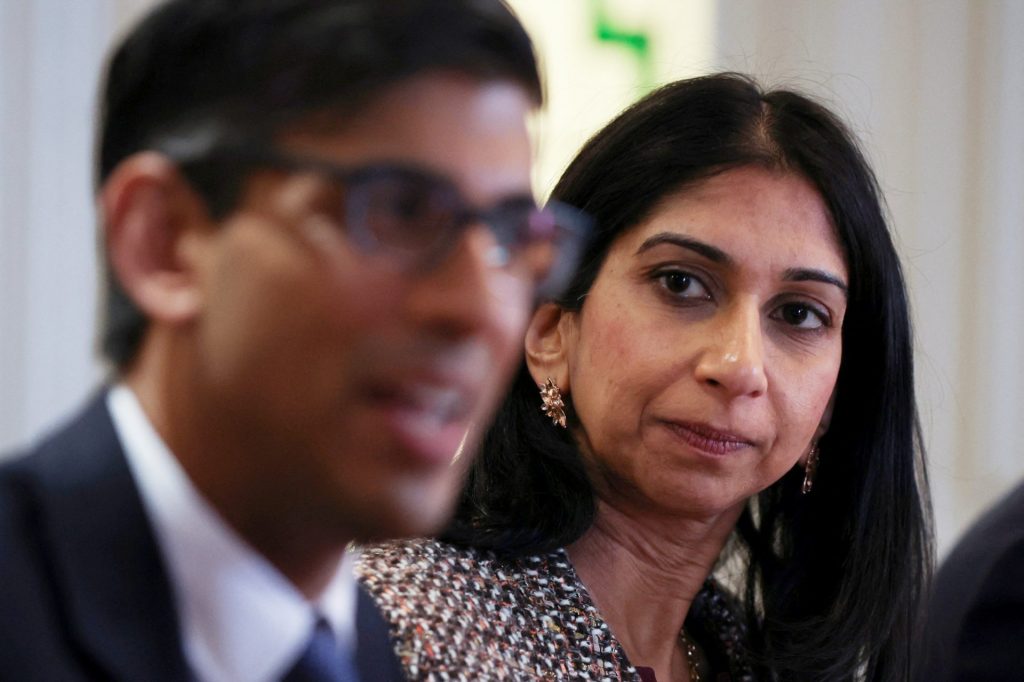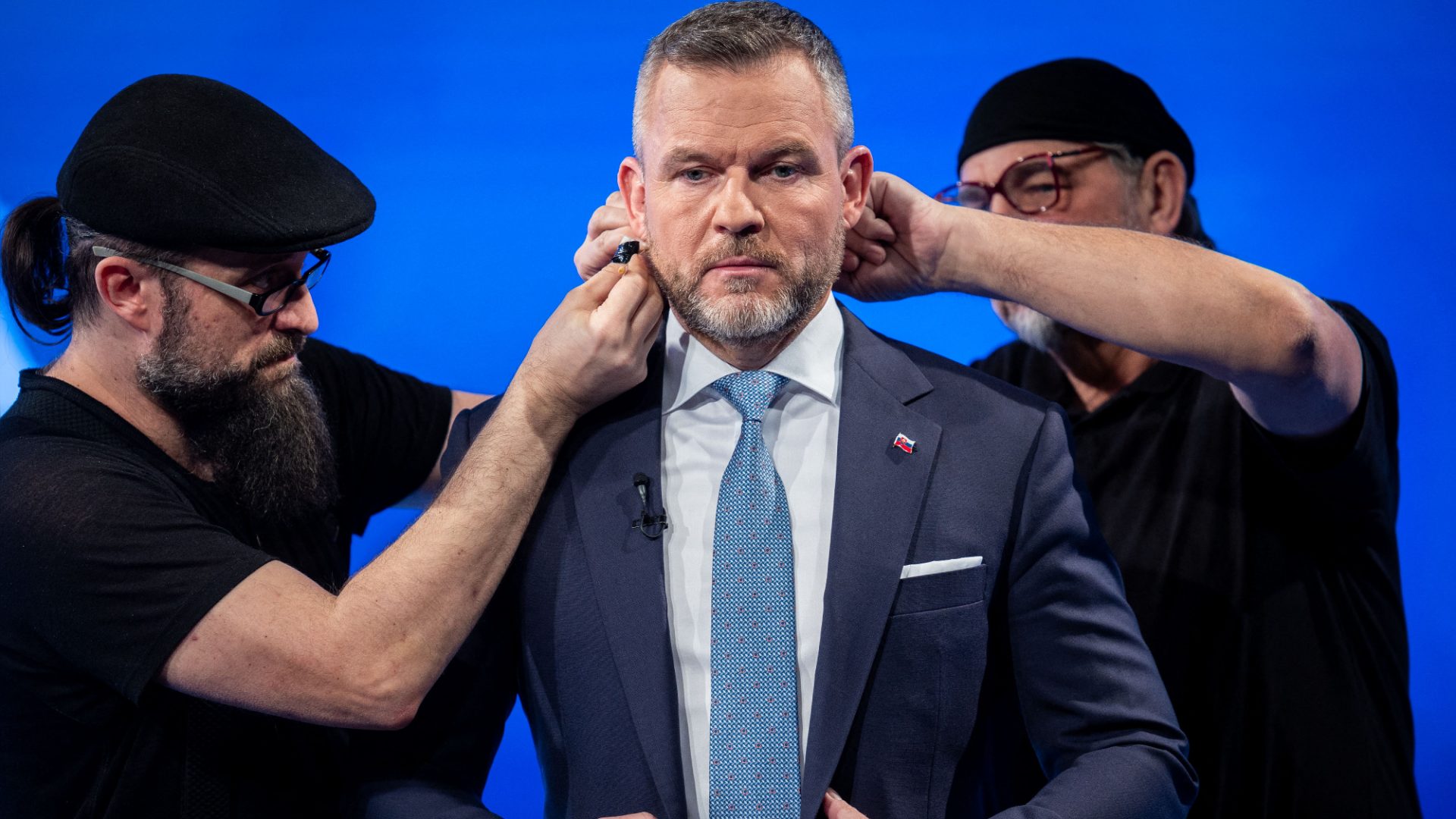Suella Braverman is back, and like much of the rest of Britain, she is less than thrilled with Rishi Sunak.
Last month, in one of a series of interventions she has made since being removed as home secretary last November, she could be found claiming that the prime minister refused to talk to her about rising legal migration numbers for an entire year – an extraordinary claim that chimes with her view of a Tory government that has lost control of immigration and a country that is the subject of an “invasion” and controlled by Islamists.
Last week, on a trip to Tel Aviv, she accused Sunak’s government for “backsliding” on its support for Israel and claimed the Foreign Office was letting “pro-Palestine” views take hold.
Braverman, who next week will share a National Conservatives conference stage with Hungary’s populist leader Viktor Orbán and Reform’s Nigel Farage, does a good line in being less than thrilled.
That was certainly how she appeared when I accosted her at an apprenticeships fair at the job centre in her Fareham constituency during the winter – and she was less than thrilled not just because I’m from the New European rather than the Daily Telegraph, with whom she has signed a lucrative deal as a columnist.
After months in the Westminster spotlight, Braverman was then feeling her way back on home turf, talking to students and local businessmen, discreetly shadowed by a couple of security men, with just a handful of aides trailing in her wake and no other journalists in sight
It was not long after Sunak had dismissed her, prompting Braverman to accuse him of “betrayal”, “magical thinking”, and “weak” leadership in one of the most scathing resignation letters anyone could remember.
“I’m here on constituency work. You need to book an appointment,” Braverman told me through a rictus smile. “Just a couple of questions,” I persisted, and short of turning on her very high heels and stalking away, she had little option but to accede.
“I’m wondering,” I asked, “whether your constituency association feels torn between loyalty to the prime minister and loyalty to you?”
I sensed her tensing. “Listen,” she retorted. “I’m a proud Conservative MP, proud to be MP for Fareham and very grateful to have had the opportunity to serve as home secretary. We’re one team and we’re pulling together, and I want the party and the prime minister to be re-elected at the next election.”
Pulling together? I doubt Sunak sees it like that. The prospects of more of her Telegraph columns will send shivers up the spines of the prime minister’s remaining backers, given what she has already contributed to the paper as a guest opinion writer.
In February, she wrote a piece headlined “Islamists are bullying Britain into submission”. “The truth is that the Islamists, the extremists and the antisemites are in charge now,” she said. “They have bullied the Labour Party, they have bullied our institutions, and now they have bullied our country into submission.”
She continued, in words that would have made Sunak bristle: “Our leaders bury their heads in the sand, preferring the illusion of a ‘successful multicultural society’. We need to wake up to what we are sleepwalking into: a ghettoised society where free expression and British values are diluted. Where sharia law, the Islamist mob and antisemites take over.”
In March, again in the Telegraph, Braverman attacked Labour’s plans to put VAT on private school fees, remarks that won her approving coverage in the Express and on GB News, the conspiracy theory channel. It’s clear that her extreme views and her ambitions have not dimmed.
Recognising her views as similar to his own, Farage recently suggested that she might leave the Tory Party and join his own. But what Braverman knows is that, when Sunak loses the general election – and shortly after that the leadership – it will open the party up for a takeover by the Conservative right – Braverman’s wing. It’s a big prize, for which the bookmakers currently rank her third-favourite, behind Kemi Badenoch and Penny Mordaunt.
Before all that though, she needs to keep her seat in the next election.
Outside, on the broad high street of this moderately well-to-do Hampshire town near Portsmouth, I met a tweed-jacketed barrister from London named Jonathan Tod. He had been barred from even entering the fair. That was because he will be standing against Braverman in the general election, for Gina Miller’s fledgling True and Fair Party.
“Jobs fair?” he snorted. “She’s got a whole pile of children to leave their classrooms to promote her career. It’s nothing to do with apprenticeships or jobs. It’s to do with a photo opportunity for her.”
It’s safe to say that Tod is not a fan of Braverman. She is “a force for bad”, he told me. She spouts “the most right wing, racist, fascist rhetoric we’ve ever heard.” It’s a disgrace, he said, that her constituency association has not disowned her.

Fareham is a traditional, true-blue, southern constituency, full of retired servicemen and women, which has voted Conservative in every election since 1885. You would expect it to embrace the traditional Tory values of loyalty, law and order, pragmatism and moral rectitude. Yet its Tory MP brazenly rebelled against a Tory prime minister, and now scarcely bothers to disguise her disdain for him, or her interest in becoming his successor.
That’s just for starters. Twice in as many years, Braverman was forced to quit as home secretary by Tory prime ministers for what might be broadly described as acts of insubordination.
She has fallen out with the last five Tory prime ministers: opposing David Cameron on Brexit; helping to scupper Theresa May’s EU withdrawal deal; joining (albeit belatedly) calls for Boris Johnson to quit over partygate; resigning from Liz Truss’s cabinet following various disagreements and for sending official documents to a backbench MP on her personal email; and then, without Sunak’s approval, publishing an incendiary article in the Times attacking the police for their handling of pro-Palestinian marches. As we have seen, she has attacked him repeatedly since leaving office.
The former barrister and attorney general has also undermined the judiciary by railing against “unelected, unaccountable” judges, and appears to have no problem with the government breaching laws and international treaties it does not like. After she accused the police of political bias, far-right thugs descended on London to confront pro-Palestinian demonstrators.
Far from seeking to unite Britain, she has routinely deployed what her critics call hateful, divisive and incendiary language, describing the influx of illegal immigrants as an invasion, calling homelessness a “lifestyle choice”, sneering at “woke rubbish” and dismissing her opponents as the “Guardian-reading, tofu-eating wokerati”. What on earth do Fareham’s Tories make of all that?
Like Braverman, Harry Kewish, chair of the constituency’s Conservative Association, appeared reluctant to speak to me. My several requests for an interview had all gone unanswered. So the day before the apprenticeships’ fair I simply turned up at the association’s office, and as luck would have it Kewish was there. He, too, could hardly turn me away without looking extraordinarily defensive.
Kewish turned out to be a retired Royal Navy commander, and he was not, to be fair, entirely uncritical of Braverman. He told me he met her after she was sacked, and she accepted her language might have been “a little bit inflammatory”, though “I don’t think she regrets it”. He said he would have advised her to “tone down” her resignation letter. And having spent 36 years in the navy, he appeared to regret her ill-discipline: “I know what discipline is all about and what it’s there for. Discipline wins battles and ill-discipline loses them.”
But as an unashamed right winger he said that neither he nor the association’s members had a problem with the substance of her pronouncements on issues like immigration. “She’s my sort of Tory,” he said, and referred me to a statement that he issued after her sacking. “It is disappointing that her strong traditional views, which are shared by significant numbers of the moral and decent people of the country, and her willingness to voice them, seem not to be reflected in this decision.”
I ask Kewish what it would take for the constituency association to disown her. “I can’t think of anything she’s likely to do that would cause me to support the argument that we should get rid of her as our candidate,” he replied. She was, he added, “an outstanding constituency MP”.
An hour later I was admiring a splendid view across Portsmouth harbour from the ninth-floor office of Sean Woodward, the Tory leader of Fareham borough council for the past 25 years and the longest-serving Conservative council leader in the country.
His support for Braverman was unqualified. He suggested that Sunak had used her to gain power, then reneged on the promises he had made to her on issues such as immigration and repealing European legislation. He admired her for being a “conviction politician” and for “telling things as they are”.
He went on: “I told the prime minister to his face in his back garden, back in the summer, ‘For goodness’ sake give Suella her head. Let her do what she wants to do.’ ‘Oh I am, I am,’ he said, but clearly not… I would like to see Rishi Sunak holding views as strongly as Suella Braverman on some of the issues we desperately need sorted.”
Woodward said most local Conservative Party members supported Braverman, and it’s hard to dispute that. To find Tory critics of the former home secretary I had to go to the neighbouring constituency of Meon Valley, which is being abolished at the next election, with a large part of it being absorbed into a new constituency of Fareham and Waterlooville.
Back in April, Braverman fought Flick Drummond, Meon Valley’s Tory MP, for the right to be the new constituency’s Conservative candidate in next year’s election. She beat her by 77 votes to 54 in what was dubbed “The Battle of Waterlooville”. It was an acrimonious affair that ended with Drummond walking out and her supporters accusing Braverman of underhand campaigning.
When I asked Patricia Stallard, who chaired the former Meon Valley Conservative Association, whether she would support Braverman in the next election, she was distinctly equivocal. “In politics 24 hours is a long time and we don’t yet know when the next election is going to be,” she replied.
“I’m just going to see what blossoms between now and the election… I will be sitting and watching to see where Suella decides to go on the national scene from here, whether she’s content being on the backbenches or whether she starts ruffling a few feathers.”
I met Drummond in the House of Commons. She is the polar opposite of Braverman – a One Nation “Compassionate Conservative” and staunch Remainer. She said of her erstwhile rival: “She certainly turns me off because her views on Muslims, her views on the homeless and her views on the [Palestinian] protests were, to me, all wrong… Her language has been very inflammatory.”
But Drummond did acknowledge that Braverman’s populist right wing views resonated with a lot of her constituents, which brings me to my second question: could she lose her seat at the next election? To which the honest answer is: nobody knows.
On the face of it Braverman should be fine. She has a majority of 26,000 in her present constituency, and the boundary changes seem unlikely to make much difference either way.
But with the feuding Tories trailing far behind Labour in every opinion poll, and having presided over the deepest economic malaise in decades, there is hardly a Conservative seat in the country that could still be described as safe. The large-scale polls released over Easter which predicted the Tories ending up with around 100 seats still had her winning – just.
Kewish says Braverman’s biggest problem is that a lot of disgruntled Tory voters may simply decide to stay at home on election day. Certainly, some of Drummond’s more centrist supporters might. “They’re still very upset,” said one.
An additional problem for Braverman is that Reform UK plans to put up a candidate, a driving instructor from Portsmouth named Kevan Chippindall-Higgin, who may well be a little fazed by Farage’s suggestion that Braverman might defect. He could steal some of her right wing voters even though he readily admits that he agrees with her on almost every major issue.
“The problem we have is not so much Suella as the Conservative Party,” he told me. “What she wants to do is bang on the money, but for whatever reason the party is not letting her.”
Labour hasn’t yet picked a candidate, while the Liberal Democrats have chosen a local councillor named Paul Gray. The Lib Dem website says that he is “Recognised by the Progressive Alliance as the strongest contender to unseat Suella Braverman,” also noting that “Paul’s campaign is marked by a commitment to unity, transparency, and progressive values”.
It is currently uncertain whether the local Labour and Lib Dem parties have formed a formal electoral pact to oust Braverman. “If they joined together they’d have every chance of winning the seat,” a senior local Conservative told me privately.
Talking to people on the streets of Fareham, I found plenty who did not like her. Braverman hated the nickname she acquired in office for her alleged habit of sharing sensitive government information on her personal phone and email – “Leaky Sue” – but she would have been equally unimpressed with what a retired naval serviceman who I met called her: “Cruella Braverman”.
A former nurse said the MP was “completely uncompassionate”. A third person described her as a “self-opinionated b**ch”. But I also found plenty of admirers, particularly on the subject of immigration.
Although Braverman was in charge of the government’s failed efforts to curb immigration for 14 months, although her plan to send asylum seekers to Rwanda has faltered, and although Fareham has only a tiny ethnic population, they seem to like her fiery rhetoric on the issue.
“I agree with what she says. She says what we’re all thinking,” said a woman who refused to give her name. “I agree with her on immigration,” a retired property dealer told me. “She had the right policies in mind, but you’ve got to have the government’s backing and Rishi Sunak has no backbone.”
This lady will surely have little trouble with Braverman’s appearance next week alongside Orbán in Brussels, where the pair are billed as keynote speakers in a conference that will focus on “preserving the nation-state” and “the revival of the unique national traditions that alone have the power to bind a people together and bring about their flourishing.”
A Braverman supporter told the Telegraph that appearing alongside a man who has led crackdowns on LGBT+ rights and press freedoms was merely a case of “MP speaks at same event as another EU leader.”
Farage will deliver another keynote address. Sadly for those who regard Braverman as being like him – an extremist stoking hatred and division – I fear Woodward, the council leader, was right when he told me: “I know some people question the language she uses, and I think she would accept that she might not always choose the best words, but the basis of what she’s saying chimes with the majority of the British people, and certainly the majority of the people of Fareham.”
Martin Fletcher is a former foreign editor, US editor and Brussels correspondent of the Times



